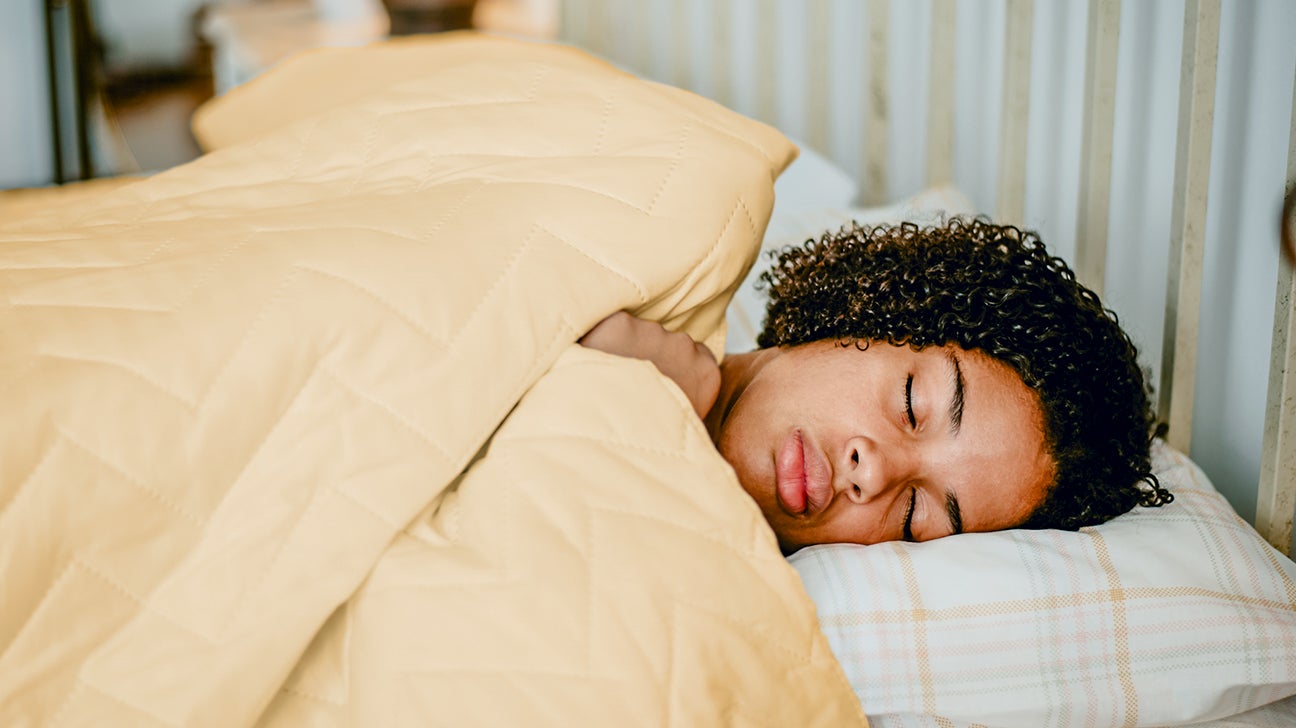If you don’t learn how to calm anxiety at night, you’ll waste hours of sleep lying awake worrying about your life.
Not only does sleep-related anxiety make it tough to drift off, but you may also find that anxiety leads to sleep disruptions that upset your daily sleep cycles.
If you have experience with insomnia related to anxiety, you’ll know the struggle of heading to bed for sleep, only to spend the night tossing and turning.
Luckily, there are plenty of treatment options that don’t require drug-heavy medical treatments to solve the issue.
If you’re looking to learn how to calm anxiety at night, try one of these expert sleep tips for calming the body and mind.
What Causes Nighttime Anxiety?

Ever laid for hours staring at the ceiling, gripped with worry in your belly? Anxiety at night can have a damaging effect on your sleep patterns.
Unfortunately, it’s quite common. In fact, 40% of Brits say they struggle with anxiety-related sleep issues.
What’s worse is that anxiety has a two-way relationship with sleep. For people with anxiety, poor sleep triggers anxiety, and heightened anxiety triggers sleep loss.
On top of that, nighttime panic can cause a nocturnal panic attack. In fact, those with anxiety disorders may be prone to panic attacks at night that leave them drained in the morning. A panic attack at night can lead to night terrors, deep breathing, and shortness of breath, all symptoms that make it tough to get back to sleep.
As Dr. Meg Arroll explains:
“Night-time panic attacks usually occur within non-REM sleep phases, from 2-3 hours after going to sleep, last for 2-8 minutes and most often only happen once per night. However, it can prove very difficult for people to get back to sleep after a panic attack and these events often stick vividly in the mind.”
The causes of nighttime anxiety are broad — you’ll find that the same issues that cause anxiety in the daytime will also affect you at night. The problem is that these anxieties seem to be worse in the evening.
This is because you’re distracted during the day but when it comes to calming down at night, you struggle to move into a more relaxed state.
As a mental health counselor, Nicky Treadway, explains:
“[During the day] they’re feeling the symptoms of anxiety, but they have better places to land them, moving from point A to B to C throughout the day.[…]At night, things are frequently quieter. There is less stimulation for distraction and more opportunity for worry.”
If you feel that your anxieties multiply at night, preventing you from sleeping, try some of these actionable tips to help you relax and drift off more calmly.
Want to Know How to Calm Anxiety at Night? Try These Strategies
Constant sleep anxiety can make for a bad night full of sleep disturbances.
If you’re tired of sleepless nights, tossing and turning with a worried mind, here are some expert sleep tips to help you quell anxiety for a more peaceful night.
#1 – Try a breathing exercise

If you have a difficult relationship between sleep and anxiety, try a controlled breathing exercise.
Not only is deep breathing a great anxiety treatment to calm your racing thoughts, but deep breaths also help to relax the physical body.
One of the most common symptoms of anxiety is shortness of breath and a tight chest. Deep breathing can help release muscle tension in the chest while calming the mind.
Try the 4 7 8 breathing exercise.
Breathe in for four seconds, hold for seven seconds, and then exhale for eight seconds. Repeat until you feel calm and your body feels tired. Some people say that 4 7 8 breathing sends them to sleep in under a minute!
If you’re really struggling to relax your mind and body, try teaming your controlled breathing exercise with some yoga stretches.
#2 – Try CBD for insomnia
CBD is short for cannabidiol, a chemical compound of the Cannabis Sativa plant.
CBD oils, gummies, and tinctures are used to treat a wide variety of health conditions. Most particularly, CBD oils and gummies are extremely effective at reducing stress, anxiety, and sleep disorders.
For those who are suffering from late-night anxiety, a CBD starter kit will give you a few different CBD products for falling asleep more easily, including a fast-acting CBD tincture and CBD gummies.
Try the CBD Starter Kit by Tranquil Earth.
#3 – Use proven relaxation techniques
If anxiety-related sleep disorders are causing restless nights, try relaxation exercises.
Build a sleep routine that incorporates regular exercise to relax the body and mind by releasing tense muscles. You’ll find that relaxation exercises work as a natural sleep aid that calms your heart rate to help you fall asleep more easily.
Progressive muscle relaxation is probably the easiest relaxation technique to incorporate into your daily activities. Not only does it help to reduce muscle tension, but it’s also been proven to be a highly effective treatment for anxiety.
If you’re looking for relaxation techniques to sleep without anxiety, try progressive muscle relaxation:
- Inhale and tense your forehead for 10 seconds.
- Exhale and release the tense muscle group.
- Relax for 10 to 20 seconds.
- Move to the next muscle group, your neck, and shoulders. Repeat the above steps.
- Move through the muscle groups repeating these steps. Tense and release your arms, hands, stomach, buttocks, thighs, calves, and feet.
#3 – Cut back on blue light exposure

If you’re experiencing chronic insomnia in your everyday life, it’s time to look at improving your sleep hygiene.
While you may be sticking to a strict sleep schedule, if you’re using your smartphone late at night, you’re likely to become a victim of sleep deprivation, which makes anxiety worse.
To practice healthy sleep habits, limit your blue light usage by cutting back on late-night device use.
Electronic devices emit blue light which suppresses the sleep hormone melatonin, sending your body clock haywire. This makes it harder to drift off to sleep, keeping you in an awake state of anxiousness.
Instead, try switching off electronic devices a few hours before bedtime.
#4 – Take a warm bath

There’s nothing like warm baths to relax the mind and body after a stressful event or day.
Not only will a hot bath release tension in your muscles, but it also stimulates the production of chemicals that help to relieve anxiety in the brain.
As a neurologist, Dr. Tara Swart, explains:
‘Immersion in warm water releases the bonding hormone oxytocin which can counteract feelings of loneliness. Our brain experiences the same feelings as if we were getting physical affection or attention from a loved one.’
Research shows that oxytocin helps to prevent the development of anxiety. In this sense, a bath before bed can help to stop anxiety creeping in late at night.
Try adding a few sleep-inducing essential oils to a bubble bath, such as lavender.
#6 – Practice mindfulness meditation
Mindfulness is the practice of grounding the mind and body by focusing on the here and now. This usually involves paying particular attention to the sounds and sensations of breathing, as well as trying to let go of thoughts to keep your mind in the present.
Mindfulness meditations often invite you to picture imaginary calming scenes or positive events, using guided visualization as a way to focus your mind.
Used to help those suffering from a range of mental health conditions, mindfulness meditation is also a commonly-used therapy for anxiety sufferers and people with insomnia.
If you’re experiencing a lack of sleep due to anxiety or a panic disorder, including mindfulness meditation into your everyday activities and sleep routine can significantly improve your quality of life.
Research shows that mindfulness meditations help reduce symptoms of anxiety as well as improving sleep health.
For best results, team your mindfulness meditation with some gentle yoga.
Looking for a sleep meditation video to get your started? Try these.
Conclusion
If you’re experiencing panic attacks at night or your anxiety disorders are causing a severe lack of sleep, it’s time to address your sleep hygiene.
Incorporating relaxation techniques into your daily activities, such as mindfulness meditation and breathing exercises, will help improve your sleep health and reduce your stress levels.
If you’re still finding it tough to nod off, try CBD therapy. It’s extremely effective at tackling anxiety problems and sleep issues, killing two birds with one stone!

Welcome to Snoozerville! I’m Dr. Alex Hartley, your guide to the world of restful sleep. With a Ph.D. in Sleep Science and years of experience as a sleep therapist, I’ve dedicated my life to understanding and improving sleep quality. My passion lies in uncovering the mysteries of sleep and sharing practical, science-backed advice to help you achieve the best rest possible. Beyond my academic pursuits, I’m an advocate for mindfulness and relaxation techniques, which I incorporate into my daily routine. At Snoozerville, I aim to transform your nights, combining the latest research with easy-to-implement tips. Whether you’re a chronic insomniac or just looking to improve your sleep hygiene, join me on this journey towards peaceful, rejuvenating sleep.


